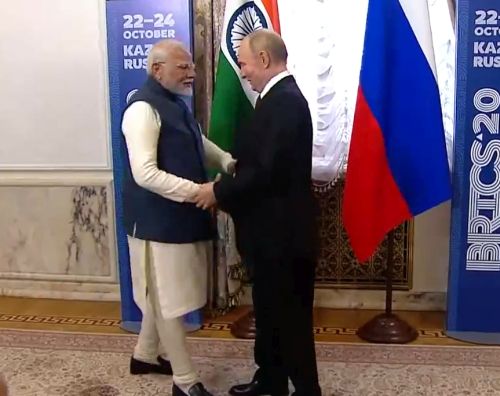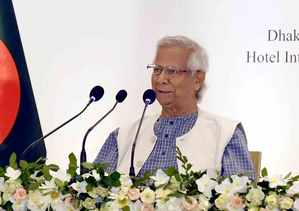International
The Third Eye: Munich tests India's foreign policy
New Delhi: In the background of India’s clear stand on the Hamas-Israel conflict denouncing the “terror” attack of Hamas on Israel on October 7 last year and endorsing the support of the US for the initial Israeli response to the same, and the country’s independent line on the much older Ukraine-Russia military confrontation which led India to even abstain from voting on the anti-Soviet resolution moved early on by the US in the UNGA, it was no surprise that at the Munich Security Conference held from February 16 to 18, External Affairs Minister (EAM) S. Jaishankar faced some searching questions on India’s foreign policy, in one of the interactive sessions.
The EAM did extremely well in detailing India’s policy approach in clear convincing terms, which is a tribute to his grip on India’s international relations as much as it is a confirmation of Prime Minister Narendra Modi’s successful stand that India’s foreign policy essentially rested on bilateral — and even multilateral — bonds meant to serve mutual security and economic interests without prejudicing the cause of world peace and global advancement of human development.
S. Jaishankar chose the words “smart policies” to describe India’s handling of international relations in this light and in reply to a reference to “non-alignment” made by the convener of the session, explaining that the global security environment is not “static” and that ideologically “fixed positions” could only come in the way of evolving a pathway of progress towards solution-finding for complex geopolitical and geoeconomic problems of today.
He indicated that being “smart” is being “positive” about serving the country’s national interests without hurting anybody else’s and embracing transparency in policy formulation.
Munich Security Conference is the world’s largest gathering of its kind debating pressing security concerns of the times under its mission of ‘Peace through Dialogue’.
This time it brought together heads of state and government of a large number of countries, foreign and defence ministers, security experts, military leaders besides defence industry captains and provided a venue for important diplomatic initiatives and interactions. Its membership cuts across BRICS and G7, and includes representatives of NATO and EU countries.
S. Jaishankar, in a brilliant exposition, explained that India was not “anti-West but non-West” and affirmed that India’s relationship with the US and Europe was getting strengthened constantly.
He highlighted the positive role of India in BRICS and the country’s contribution towards the expansion of G7 into G20 — all through the process of discussions and meetings — and succeeded in presenting India as a major independent power helping the cause of world peace and economic development.
He interacted with the Chinese Foreign Minister on the sidelines and had a separate extensive discussion with US Secretary of State Anthony Blinken to review the situation in West Asia, Ukraine and the Indo-Pacific.
The Munich Security Conference confirmed that India’s participation was acknowledged by the world as being of crucial importance and that it helped to evolve shared perspectives for leveraging the collaborative effort of India and the US to address common challenges and harness mutual benefits.
In today’s unsafe world environment and an uneven trajectory of the global economy, India is registering rapid growth, moving towards self-reliance in various spheres including defence and security and pushing up a sense of nationalism among Indians based on India’s civilisational strength that unites rather than divides the people.
India and the US, the two largest tested democracies of the world, recognise the importance of working together to save the ‘rules-based order’ at a time when forces of Marxist dictatorship and ‘fundamentalist’ dispensations were joining hands to destabilise the world.
The strategic alliance between China and Pakistan now developed to the point where these two adversaries are collaborating in conducting covert operations against India, particularly in the border states of J&K and Punjab, which is a prime security threat for India and validates India’s policy of strengthening Indo-US relations generally and stepping up its association with the Quad.
Terrorism resulting from the spread of radicalisation in the Islamic world is another common concern that binds India and the US together in leading the democratic world against this new global threat.
An important task before India is to get policymakers of the US to see Pakistan without tinted glasses and overcome the legacy of the Pentagon’s commitment to the Pak generals.
It would do them good to recall that Pakistan was a reluctant partner of the US in the ‘war on terror’ and that it managed to keep an equation with Al Qaeda, Taliban and ISIS.
Pakistan helped the installation of the Taliban Emirate at Kabul in 1996 and ensured the subsequent return of Taliban rule to Afghanistan in 2021 on the conclusion of Doha peace talks that were held to facilitate the withdrawal of American troops from the messy Afghan territory.
Pakistan had pretended to be a mediator in these talks but was in fact advancing its duplicitous policy of remaining on the right side of the US without giving up on its faith-based commitment to sustaining Islamic radical outfits.
The US is hopefully coming out of the flawed old policy of trying to create a balancing interface between Indo-US and US-Pakistan relationships.
Pakistan has made the Pak-Afghan belt a home ground for Islamic radical forces and supported China’s ingress into Afghanistan through the latter’s Belt& Road Initiative (BRI).
It had already allowed the China-Pak Economic Corridor (CPEC) to pass through the Northern Areas of POK against strong protestation by India.
The Sino-Pak axis is influencing the current geopolitics in a major way and the American administration must take a call on this as a shared concern of India and the US.
In the recent election in Pakistan, the Army came in the way of Imran Khan who had consistently condemned the US and who was compelled to fight the election from prison without availing of any party symbol.
This, however, should bring no comfort to America because in the uncertain political scene in Pakistan that prevailed through the polls, ‘radicalism’ in the Khyber Pakhtunkhwa-Afghanistan region did become stronger.
Both the US and India realise that the Israel-Hamas conflict sparked off by the planned attack of radicalised Hamas on Israel on October 7, 2023, drew attention to a worrying new factor in the Middle East – the constant advance made by Islamic radical forces wedded to ‘faith-based’ terror, in the Muslim world.
The old ‘political’ dispute between Israel and Palestine is now overtaken by a confrontation driven by ‘religion and Jehad’ — this should cause serious concern to the world at large.
India under Prime Minister Modi has been exceptionally successful in countering this trend by pushing up economic development in West Asia to the top of the regional agenda and pitching on the “connectivity” of the Middle East with the rest of the world as a means of furthering that project.
Again, India’s initiatives in this regard rest on the fundamental policy of forging bilateral bonds for mutual security and economic benefits.
As a consequence of this, there is now a dividing line between close US friends like Saudi Arabia and UAE with their approach of moderation towards Israel and the radical states like Yemen, Syria and Qatar who supported Hamas’ stand of refusing to recognise the very existence of the Israel state.
There is also a new level of Shia-Sunni conflict in West Asia because the fundamentalist regime of Ayatollahs in Iran with its total antipathy towards the US and Israel was actively encouraging its ‘proxies’ in the region to fight for Hamas and against Israel.
India has done the right thing in denouncing the terror attack of Hamas on Israel and calling for caution on the part of Israel so that in its pursuit of Hamas, civilian casualties of the Palestinian population did not throw up a ‘human’ crisis.
India also made it clear that it favoured the “two-state solution” in Palestine.
India has joined hands with the US and Europe to launch the India-Middle East-Europe economic corridor to promote the cause of global economic growth and check the spread of Islamic radical forces in the region.
India understands the US anxiety about the release of hostages captured by Hamas for using them as a “weapon” against Israel and hopes that with the mediation of a country like Egypt, a pause in the military drive of Israel would strengthen the prospect of the release of hostages.
India has taken an independent-looking stand on the Middle East just as it had shown an upright response to the Ukraine-Russia military conflict, with Prime Minister Modi declaring at the beginning of that confrontation itself that “this is not an era of war” and calling for a cessation of hostilities in favour of talks for peace in which security concerns of both sides would be given due attention.
The stand of India has been understood by the world at large. At the Munich Security Conference, S. Jaishankar convincingly reiterated how India’s responses to the Ukraine-Russia and the Israel-Hamas conflicts best served the cause of global peace without letting the old political constructs of “alignment” come in the way.
For India, the priority was to constantly seek the betterment of its people through the pursuit of bilaterally useful economic benefits that did not hurt anybody else.
Munich has helped — because of the interventions of S. Jaishankar — to project India’s foreign policy as the voice of sanity in today’s conflict-prone global scenario.
(The writer is a former Director of the Intelligence Bureau. Views are personal)
–IANS
dcpathak/sha
International
Lee Hsien Yang seeks refuge in United Kingdom

Lee Hsien Yang, the youngest son of Singapore’s founding father, the late Lee Kuan Yew, announced on Tuesday that he is now a political refugee in the United Kingdom after seeking asylum from the British government “as a last resort.”
“I remain a Singapore citizen and hope that someday it will be safe to return home,” Lee stated in a Facebook post, as reported by Channel News Asia (CNA).
Citing what he described as the Singapore government’s “attacks” against him, Lee, who is the younger brother of former Prime Minister Lee Hsien Loong, revealed that he sought asylum protection in 2022.
Lee Hsien Yang and his late sister, Lee Wei Ling, who passed away earlier this month, have been in conflict with their brother Lee Hsien Loong over the fate of their father’s home following his death in 2015, resulting in a public dispute that has estranged the siblings.
In an interview with the UK-based newspaper The Guardian, Lee alleged that a “campaign of persecution” compelled him to seek asylum in Britain.
In response to his claims, the Singapore government stated that there is “no basis” for his allegations of “a campaign of persecution” or other assertions regarding political repression in the country.
“Singapore’s judiciary is impartial and makes decisions independently. This is why Singaporeans have a high level of trust in the judiciary,” a government spokesperson remarked.
The spokesperson added that there are no legal restrictions preventing Lee and his wife, lawyer Lee Suet Fern, from returning to Singapore. “They are and have always been free to return to Singapore,” the spokesperson said.
Lee and his wife have been outside of Singapore since 2022, having opted not to attend a scheduled police interview regarding potential offenses related to providing false evidence in judicial proceedings concerning their father’s will and the family home.
Lee and his late sister, who had been living at the property, alleged they felt threatened while trying to fulfill their father’s wish to demolish the house. They also accused their elder brother, former Prime Minister Lee Hsien Loong, of abusing his governmental influence to advance his personal agenda.
International
Indo-Russian ties are stronger than ever before at BRICS

Kazan, Russia: Prime Minister Narendra Modi held a bilateral meeting with Russian President Vladimir Putin on the sidelines of the 16th BRICS Summit.
During the meeting, President Putin remarked, “I recall our meeting in July, where we had productive discussions on various issues. We’ve also spoken over the phone several times. I am very grateful you accepted the invitation to come to Kazan. Today, we will attend the BRICS Summit’s opening ceremony, followed by dinner.”
PM Modi responded by expressing his appreciation, saying, “I sincerely thank you for your friendship, warm welcome, and hospitality. It’s a great pleasure to visit such a beautiful city as Kazan for the BRICS Summit. India shares deep historical ties with this city, and the opening of our new embassy here will further strengthen these connections.”
International
Laos seeks to enhance nutrition amid climate change concerns

Vientiane (Laos), Aug 22 (IANS) Representatives from the Lao government and development partners have attended a conference here titled “Climate Change and Nutrition in Laos: Intersections and Interventions” to discuss the impact of climate change on nutrition in the Southeast Asia country and potential solutions.
Speaking at the conference, deputy director general of the Department of Hygiene and Health Promotion under the Lao Ministry of Health Viengkhan Phixay, said, “We gather to address a critical and interwoven issue: the impact of climate change on nutrition and how we can work together to tackle these challenges,” Xinhua news agency reported.
The Lao government is actively engaged in this endeavor, with numerous policies and initiatives aimed at addressing both climate change and nutrition, Lao National Television reported on Thursday.
“By leveraging the Scaling Up Nutrition network in Laos, which is led by the government, and supported by civil society, donors, and the United Nations, we have a robust platform to tackle the negative impacts of climate change while improving nutrition and overall health for everyone in Laos,” Viengkham said at the conference held on Monday.
The conference featured a series of presentations that not only detailed evidence-based research but also introduced innovative tools for measuring and enhancing nutrition under the impact of climate change.
The conference stressed the critical need for integrated approaches to tackle the intertwined challenges of climate change and nutrition, and setting the stage for impactful future collaborations.
–IANS
int/psd
International
One killed, seven injured in shootout in Iraq

Baghdad, Aug 22 (IANS) A civilian was killed while seven others were injured on Thursday in a tribal shootout in Iraq’s holy Shiite province of Najaf, according to a local security source.
The shootout erupted in the early hours between armed men from the local tribe in the al-Zarga area in northern Najaf, some 160 km south of Baghdad, a local police officer told Xinhua on condition of anonymity.
The clash resulted in the killing of an Iraqi civilian and the injury of seven others, including three Iranian Shiite pilgrims, the source added.
A joint force from the Interior Ministry’s emergency response division and Najaf provincial police arrested 53 gunmen from both sides of the shootout and seized weapons and ammunition, the Interior Ministry said in a statement.
It added that search operations are ongoing to locate additional gunmen and weapons, with more details to be released later.
The incident took place as numerous pilgrims traveled to the city of Karbala to observe Arbaeen, which marks the end of a 40-day mourning period for the killing of Imam Hussein, the grandson of Prophet Muhammad, in the Battle of Karbala in 680 A.D.
Typically, these pilgrims also visit Najaf as part of their journey to Karbala.
–IANS
int/jk/arm
International
Bangladesh seeks $1 billion budget support from World Bank

Dhaka, Aug 22 (IANS) Bangladesh’s interim government has sought $1 billion from the World Bank as budgetary support.
The call came from the country’s Power, Energy and Mineral Resources Adviser Muhammad Fouzul Kabir Khan’s meeting with Abdoulaye Seck, the World Bank’s Country Director for Bangladesh and Bhutan, in Dhaka on Wednesday.
He made the plea as the ministry owes more than 2 billion dollars to suppliers in import costs of power and energy, Xinhua news agency reported.
Khan mentioned that the interim government, which was formed with many pressing mandates, is due to settle a $2 billion debt left by the previous government in the power sector.
He said they have already suspended activities under the much-criticized Quick Enhancement of Electricity and Energy Supply Act 2010 and abolished the government’s power to set energy prices without any public hearing.
On August 5, the former Prime Minister of Bangladesh, Sheikh Hasina, was ousted from her country and power, ending her rule since January 2009.
This event was seen as a massive escalation, with what initially started as student’s protests and resulted in a major crisis in Bangladesh.
Earlier on August 8, Nobel laureate Muhammad Yunus took oath as the head of Bangladesh’s interim government.
–IANS
int/jk/as
-
Video2 years ago
PM Modi Attacks Congress in Karnataka with “Kerala Story”
-
Politics2 years ago
Siddaramaiah & DK Shivakumar sworn in as Chief Minister & Deputy CM respectively
-
Cricket2 years ago
CSK players rejoice 5th IPL title with their families (Pics)
-
Entertainment2 years ago
Karan Deol weds his longtime Girlfriend Drisha Acharya (Pics)
-
Sports7 years ago
History Of Official FIFA WORLD CUP Match balls
-
India2 years ago
Ashwini Vaishnaw: Railway Board recommends CBI probe in the Odisha railway disaster
-
Entertainment2 years ago
Urvashi Rautela dazzles on Cannes 2023 red carpet (Pics)
-
Entertainment2 years ago
Sunny Leone gets ready for Kennedy premiere in Cannes (Pics)






























